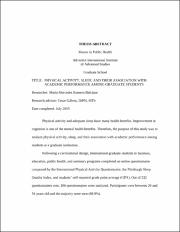| dc.description.abstract | Physical activity and adequate sleep have many health benefits. Improvement in cognition is one of the mental health benefits. Therefore, the purpose of this study was to analyze physical activity, sleep, and their association with academic performance among students at a graduate institution.
Following a correlational design, international graduate students in business, education, public health, and seminary programs completed an online questionnaire composed by the International Physical Activity Questionnaire, the Pittsburgh Sleep Quality Index, and students’ self-reported grade point average (GPA). Out of 232 questionnaires sent, 106 questionnaires were analyzed. Participants were between 20 and 54 years old and the majority were men (68.9%).
The mean of the participants’ self-reported GPAs was 3.69. The participants who were 35 years old and below had lower grades than the participants who were between 36 and 45 years old. Over 80% of the participants were at an acceptable physical activity level. Men practiced more physical activity; however, they also spent more time sitting per day than women. Education students spent lesser time sitting per day than students from the Seminary and Public Health Department; public health students walked lesser than education and Seminary students. Sleep quantity and quality were considered to classify a participant to be good or poor sleeper. The majority of the participants (60.4%) had good sleep quality, and the mean hours of sleep per night was 6.46. Females slept more hours per night than males. The students who were 35 years and below had more day dysfunction due to sleepiness than older students.
It was found out that there was no significant association between physical activity and sleep (grouped and individually) and academic performance. This lack of association may be explained by the small population, the small number of respondents, and the small range of GPA in graduate students, which may hide the possible effects of being physically inactive and/or having inadequate sleep. Additionally, a prediction model showed that age was positively associated with the student’s GPA, possibly because of the higher sense of responsibility and experience in graduate contexts. More studies are recommended measuring student’s performance using an objective and more precise measure of cognition in graduate students; longitudinal and experimental studies are recommended as well; and finally, understanding the social and cultural situation of the particular population may provide a holistic approach. | en_US |

